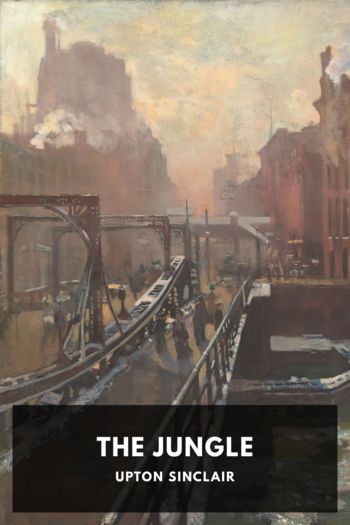Arrowsmith by Sinclair Lewis (learn to read books txt) 📕

- Author: Sinclair Lewis
Book online «Arrowsmith by Sinclair Lewis (learn to read books txt) 📕». Author Sinclair Lewis
Trained now to the false cheerfulness of the doctor, he shouted, when she was racked and ghastly with the indignity of morning sickness, “There, that’s fine, old girl! Wouldn’t be making a good baby if you weren’t sick. Everybody is.” He was lying, and he was nervous. Whenever he thought of her dying, he seemed to die with her. Barren of her companionship, there would be nothing he wanted to do, nowhere to go. What would be the worth of having all the world if he could not show it to her, if she was not there—
He denounced Nature for her way of tricking human beings, by every gay device of moonlight and white limbs and reaching loneliness, into having babies, then making birth as cruel and clumsy and wasteful as she could. He was abrupt and jerky with patients who called him into the country. With their suffering he was sympathetic as he had never been, for his eyes had opened to the terrible beauty of pain, but he must not go far from Leora’s need.
Her morning sickness turned into pernicious vomiting. Suddenly, while she was torn and inhuman with agony, he sent for Dr. Hesselink, and that horrible afternoon when the prairie spring was exuberant outside the windows of the poor iodoform-reeking room, they took the baby from her, dead.
Had it been possible, he might have understood Hesselink’s success then, have noted that gravity and charm, that pity and sureness, which made people entrust their lives to him. Not cold and blaming was Hesselink now, but an older and wiser brother, very compassionate. Martin saw nothing. He was not a physician. He was a terrified boy, less useful to Hesselink than the dullest nurse.
When he was certain that Leora would recover, Martin sat by her bed, coaxing, “We’ll just have to make up our minds we never can have a baby now, and so I want—Oh, I’m no good! And I’ve got a rotten temper. But to you, I want to be everything!”
She whispered, scarce to be heard:
“He would have been such a sweet baby. Oh, I know! I saw him so often. Because I knew he was going to be like you, When you were a baby.” She tried to laugh. “Perhaps I wanted him because I could boss him. I’ve never had anybody that would let me boss him. So if I can’t have a real baby, I’ll have to bring you up. Make you a great man that everybody will wonder at, like your Sondelius … Darling, I worried so about your worrying—”
He kissed her, and for hours they sat together, unspeaking, eternally understanding, in the prairie twilight.
XVII IDr. Coughlin of Leopolis had a red mustache, a large heartiness, and a Maxwell which, though it was three years old this May and deplorable as to varnish, he believed to be the superior in speed and beauty of any motor in Dakota.
He came home in high cheerfulness, rode the youngest of his three children pickaback, and remarked to his wife:
“Tessie, I got a swell idea.”
“Yes, and you got a swell breath, too. I wish you’d quit testing that old Spirits Frumentus bottle at the drug store!”
“Attagirl! But honest, listen!”
“I will not!” She bussed him heartily. “Nothing doing about driving to Los Angeles this summer. Too far, with all the brats squalling.”
“Sure. All right. But I mean: Let’s pack up and light out and spend a week touring ’round the state. Say tomorrow or next day. Got nothing to keep me now except that obstetrical case, and we’ll hand that over to Winter.”
“All right. We can try out the new thermos bottles!” Dr. Coughlin, his lady, and the children started at four in the morning. The car was at first too well arranged to be interesting, but after three days, as he approached you on the flat road that without an inch of curving was slashed for leagues through the grassy young wheat, you saw the doctor in his khaki suit, his horn-rimmed spectacles, and white linen boating hat; his wife in a green flannel blouse and a lace boudoir cap. The rest of the car was slightly confused. While you motored by you noticed a canvas Egyptian Water Bottle, mud on wheels and fenders, a spade, two older children leaning perilously out and making tongues at you, the baby’s diapers hanging on a line across the tonneau, a torn copy of Snappy Stories, seven lollypop sticks, a jack, a fish-rod, and a rolled tent.
Your last impression was of two large pennants labeled “Leopolis, N.D.,” and “Excuse Our Dust.”
The Coughlins had agreeable adventures. Once they were stuck in a mud-hole. To the shrieking admiration of the family, the doctor got them out by making a bridge of fence rails. Once the ignition ceased and, while they awaited a garageman summoned by telephone, they viewed a dairy farm with an electrical milking machine. All the way they were broadened by travel, and discovered the wonders of the great world: the movie theater at Roundup, which had for orchestra not only a hand-played piano but also a violin; the black fox farm at Melody; and the Severance water-tower, which was said to be the tallest in





Comments (0)